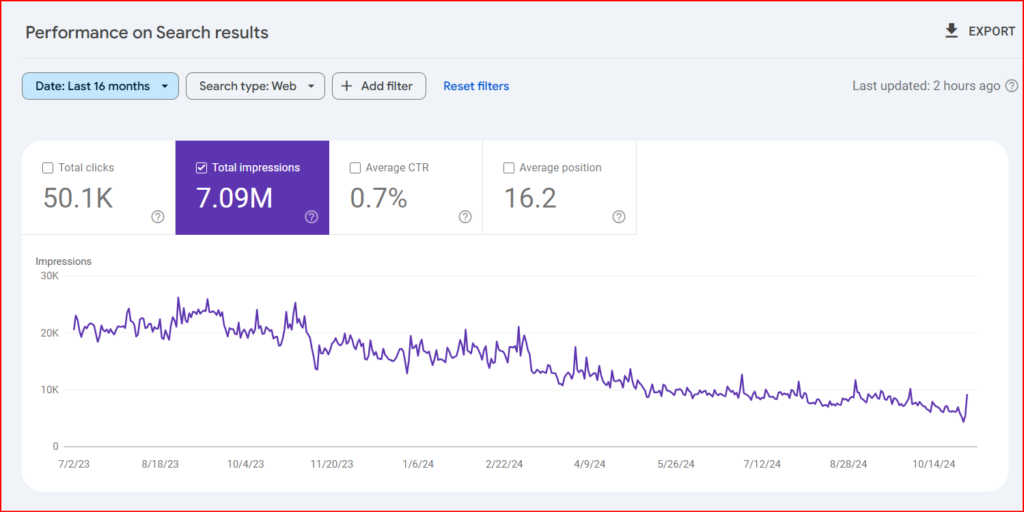
The article was first published on LinkedIn.
One of my clients, a small business owner in the logistics industry in India, has a website that gives useful information to his audience. His website got a lot of traffic, and he used to make good revenue out of it.
That’s when Google’s Helpful Content update (HCU) stuck his website, resulting in a steep decline in his organic traffic and hence revenue. Though Google rolled out HCU with a goal of promoting content that gives useful content for the user, it has inadvertently (or was it by design?) left many small businesses reeling.

In this article, I am trying to break down how Google’s HCU appears to have put the future of many small businesses in jeopardy and what the future might hold for organic search.
You may like to read the blog post How to create search engine friendly content.
Google HCU has affected almost all the websites, but its impact on small businesses and affiliate sites has been severe. Large websites with many branded keyword searches were able to recover from the impact of HCU. However, for small businesses, with limited resources, adjusting their content to overcome the negative impacts of HCU isn’t easy.
As for my client, the decline in organic traffic and visibility has led to significant loss of revenue. Despite following all of Google recommendations on how to recover from HCU, his website’s results have been ineffective, triggering further southward movement. The lack of results and the dearth of support from Google have left him with mounting frustration.
Following industry discussions on social media, you will realize that all across the world, small businesses and affiliate sites are struggling to come to terms with HCU and are losing out on a lot of revenue.
At a time when Google rolls out algorithm updates claiming to help users find better results, they are making small business owners feel abandoned. For those looking to Google for guidance on adapting to HCU, the search engine giant’s limited support and vague recommendations are adding to the frustration.
Google’s recommendations on adapting to an algorithm update is often confusing, creating a gap where business owners are left guessing. Other than the basic guidelines that Google often gives website owners and SEOs to create helpful content for users, there are rarely any update-specific recommendations.
At the end of the day, Google’s algorithm updates end up harming small time businesses, while helping large businesses thwart competition from small players.
Google has a longstanding distrust with SEOs, where the search engine major thinks the SEOs always try to manipulate their search algorithm. However, the truth remains that SEOs have been instrumental in helping many small and medium businesses to achieve visibility online.
Now with the HCU update, Google has further pushed out SEOs from the search engine game, making it more difficult for small businesses to keep their websites competitive vis-à-vis their larger competitors.
Danny Sullivan of Google was also recently seen imploring small business owners to “move on” rather than worry about and strive for improving organic traffic that was affected by the HCU. The comment comes across as rather insensitive and seems to mock small businesses.

For some time, industry watchers have been questioning whether Google is sidelining organic search in favour of paid ads. Google’s revenue-driven approach has led to an increased emphasis on paid ads, pushing businesses to invest more on paid ad campaigns. Many argue that HCU is a shrewd move by the big G to force small and medium businesses to consider paid options to remain competitive in their industry.
However, leaving organic search and investing more in paid ads may not be financially sustainable for small and medium businesses. For many years, organic search has been a promising option for businesses to increase online visibility and growth.
It is yet to be seen if such a move would benefit even Google in the long term, as businesses may look for alternatives that are more viable for their existence.
With the arrival of AI tools, particularly ChatGPT, many users are moving away from Google for their searches. These tools are becoming go-to sources of information for many users. ChatGPT’s recent launch of their own search (ChatGPT Search) function poses a significant threat to Google search.
Recently we have also seen Google itself giving a lot of importance to forums like Reddit and Quora. We have been seeing Reddit results increasingly ranking higher on Google SERPs, particularly for niche topics and questions. The real-life experience and insights shared by the community hold more trust value for many users.
With HCU, if Google is trying to demote small business websites that provide useful information to the audience, people may shift further away from Google search.
At a time when there is a lot of criticism of Google and its organic search results, the search engine major has made some leadership changes. Particularly, the replacement of Prabhakar Raghavan, Google’s Head of Search and Ads, with Nick Fox adds an interesting angle to this situation. Though a change or a roll back of the HCU is almost out of question, the change in leadership might be signalling a shift in Google’s priorities.
Many hope that the change in leadership could mean a renewed focus on organic search and in providing better support to small and medium businesses. As of now, small businesses continue to struggle to regain their lost traffic and revenue due to HCU. The road to recovery is long and challenging, and I fear they may not be able to recover at all.
Contact me if you want to drive quality traffic to your website with SEO and content.
0 Comments
Add a comment
By using form u agree with the message sorage, you can contact us directly now